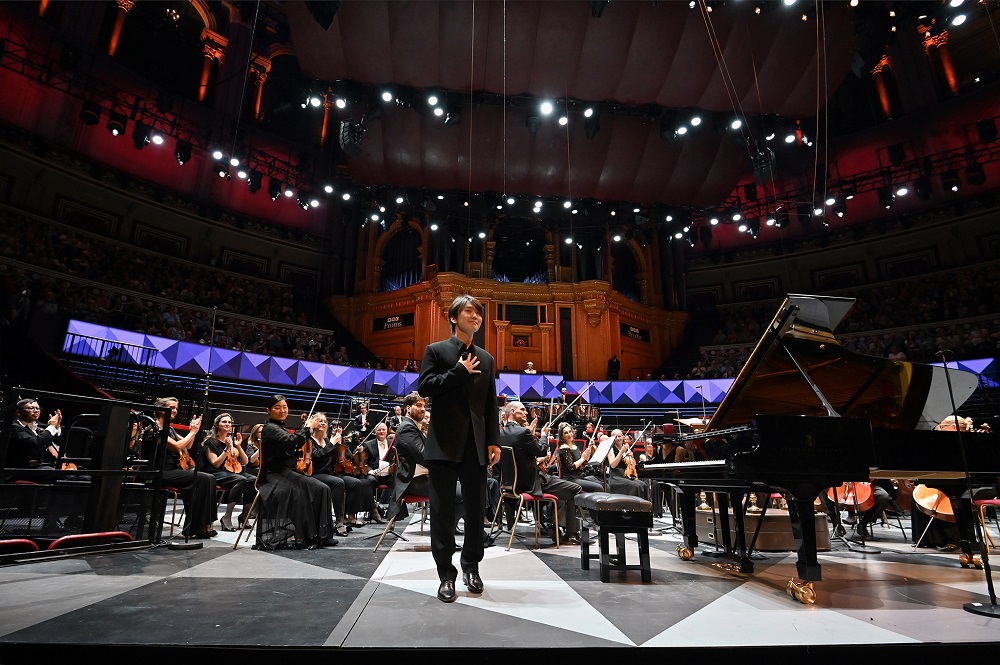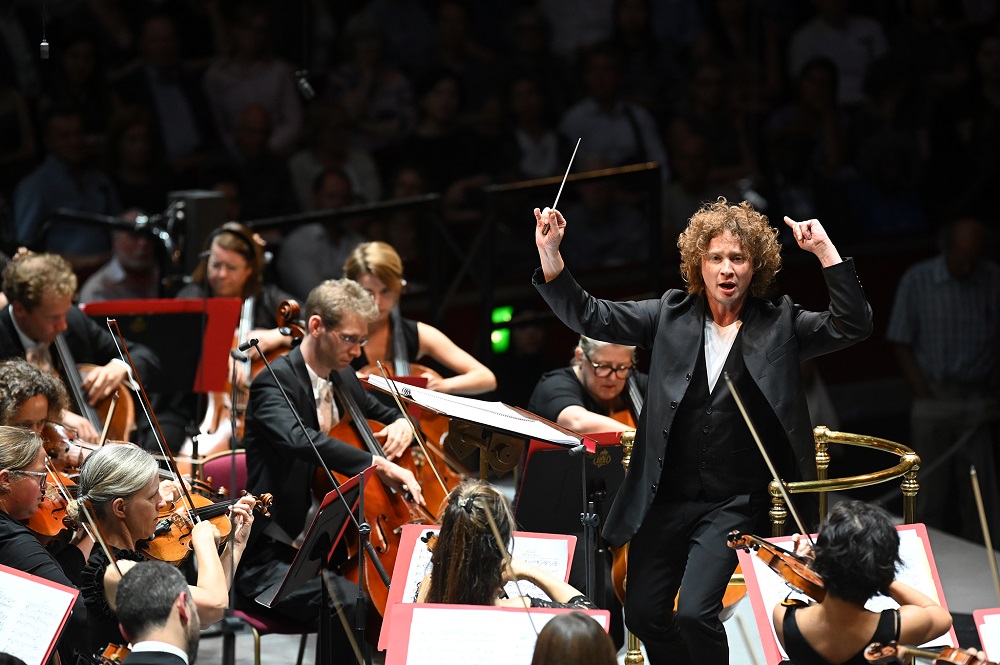Prom 42: Cho, Philharmonia, Rouvali review - inflation offset by sweet oases | reviews, news & interviews
Prom 42: Cho, Philharmonia, Rouvali review - inflation offset by sweet oases
Prom 42: Cho, Philharmonia, Rouvali review - inflation offset by sweet oases
Chopin en rose, Elgar and Richard Strauss in Italy
Chopin’s piano concertos and Strauss “symphonic fantasia” Aus Italien are young men’s music, bursting with inspired ideas, but baggy at times, hard to steer. Elgar’s In the South is up there with the mature Strauss tone poems – even if it couldn’t have taken the shape it did without them – but here the steering itself was the problem: missing the exuberance, the Philharmonia’s Principal Conductor Santtu-Matias Rouvali stretched it on the rack.
It was an odd Prom to win a packed house. Many audience members were Korean, come to see and hear Seong-Jin Cho, winner of the 2015 International Chopin Competition at the age of 21 and possessed of an exquisite sensibility; my neighbour told us that tickets to see him in Seoul were almost impossible to come by. She and others wouldn’t have been disappointed. Pearly-pretty in roulades and transcendental flourishes, never as vulgar as the brothel pink lighting in which the hall was bathed for the duration,Cho still projected every note clearly into the vasts.. Cho says Santtu is his “musical soulmate”, and you could see as well as hear the close, lovingly-phrased partnership. 
Palpable affectation marred Rouvali’s opening gambit. Elgar’s Italian chronicle begins with a swaggering gambit starts with a gesture indebted to Strauss’s Don Juan – it was actually sketched as a theme depicting Hereford organist Sinclair’s bulldog Dan, immortalized in the "Enigma" Variations. So where was the bravado; why the portentousness? Timing isn’t everything, but note that Elgar’s first, 1923 recording as conductor runs to 16 minutes, while this took 23. Once past the brass-heavy opening – it may be the acoustics from where I was sitting, but splendid as the Philharmonia players, horns especially, undoubtedly were, the blend was poor – subtleties were beautifully etched. The Roman cohorts' brutal march worked well, but the “popular song” on viola, coming as much-needed simplicity, needs to be gently moved along, or else it sounds maudlin, as it did here. 
rating
Share this article
The future of Arts Journalism
You can stop theartsdesk.com closing!
We urgently need financing to survive. Our fundraising drive has thus far raised £49,000 but we need to reach £100,000 or we will be forced to close. Please contribute here: https://gofund.me/c3f6033d
And if you can forward this information to anyone who might assist, we’d be grateful.

Subscribe to theartsdesk.com
Thank you for continuing to read our work on theartsdesk.com. For unlimited access to every article in its entirety, including our archive of more than 15,000 pieces, we're asking for £5 per month or £40 per year. We feel it's a very good deal, and hope you do too.
To take a subscription now simply click here.
And if you're looking for that extra gift for a friend or family member, why not treat them to a theartsdesk.com gift subscription?
more Classical music
 Monteverdi Choir, ORR, Heras-Casado, St Martin-in-the-Fields review - flames of joy and sorrow
First-rate soloists, choir and orchestra unite in a blazing Mozart Requiem
Monteverdi Choir, ORR, Heras-Casado, St Martin-in-the-Fields review - flames of joy and sorrow
First-rate soloists, choir and orchestra unite in a blazing Mozart Requiem
 Cho, LSO, Pappano, Barbican review - finely-focused stormy weather
Chameleonic Seong-Jin Cho is a match for the fine-tuning of the LSO’s Chief Conductor
Cho, LSO, Pappano, Barbican review - finely-focused stormy weather
Chameleonic Seong-Jin Cho is a match for the fine-tuning of the LSO’s Chief Conductor
 Classical CDs: Shrouds, silhouettes and superstition
Cello concertos, choral collections and a stunning tribute to a contemporary giant
Classical CDs: Shrouds, silhouettes and superstition
Cello concertos, choral collections and a stunning tribute to a contemporary giant
 Appl, Levickis, Wigmore Hall review - fun to the fore in cabaret and show songs
A relaxed evening of light-hearted fare, with the accordion offering unusual colours
Appl, Levickis, Wigmore Hall review - fun to the fore in cabaret and show songs
A relaxed evening of light-hearted fare, with the accordion offering unusual colours
 Lammermuir Festival 2025, Part 2 review - from the soaringly sublime to the zoologically ridiculous
Bigger than ever, and the quality remains astonishingly high
Lammermuir Festival 2025, Part 2 review - from the soaringly sublime to the zoologically ridiculous
Bigger than ever, and the quality remains astonishingly high
 BBC Proms: Ehnes, Sinfonia of London, Wilson review - aspects of love
Sensuous Ravel, and bittersweet Bernstein, on an amorous evening
BBC Proms: Ehnes, Sinfonia of London, Wilson review - aspects of love
Sensuous Ravel, and bittersweet Bernstein, on an amorous evening
 Presteigne Festival 2025 review - new music is centre stage in the Welsh Marches
Music by 30 living composers, with Eleanor Alberga topping the bill
Presteigne Festival 2025 review - new music is centre stage in the Welsh Marches
Music by 30 living composers, with Eleanor Alberga topping the bill
 Lammermuir Festival 2025 review - music with soul from the heart of East Lothian
Baroque splendour, and chamber-ensemble drama, amid history-haunted lands
Lammermuir Festival 2025 review - music with soul from the heart of East Lothian
Baroque splendour, and chamber-ensemble drama, amid history-haunted lands
 BBC Proms: Steinbacher, RPO, Petrenko / Sternath, BBCSO, Oramo review - double-bill mixed bag
Young pianist shines in Grieg but Bliss’s portentous cantata disappoints
BBC Proms: Steinbacher, RPO, Petrenko / Sternath, BBCSO, Oramo review - double-bill mixed bag
Young pianist shines in Grieg but Bliss’s portentous cantata disappoints
 theartsdesk at the Lahti Sibelius Festival - early epics by the Finnish master in context
Finnish heroes meet their Austro-German counterparts in breathtaking interpretations
theartsdesk at the Lahti Sibelius Festival - early epics by the Finnish master in context
Finnish heroes meet their Austro-German counterparts in breathtaking interpretations
 Classical CDs: Sleigh rides, pancakes and cigars
Two big boxes, plus new music for brass and a pair of clarinet concertos
Classical CDs: Sleigh rides, pancakes and cigars
Two big boxes, plus new music for brass and a pair of clarinet concertos
 Waley-Cohen, Manchester Camerata, Pether, Whitworth Art Gallery, Manchester review - premiere of no ordinary violin concerto
Images of maternal care inspired by Hepworth and played in a gallery setting
Waley-Cohen, Manchester Camerata, Pether, Whitworth Art Gallery, Manchester review - premiere of no ordinary violin concerto
Images of maternal care inspired by Hepworth and played in a gallery setting

Add comment